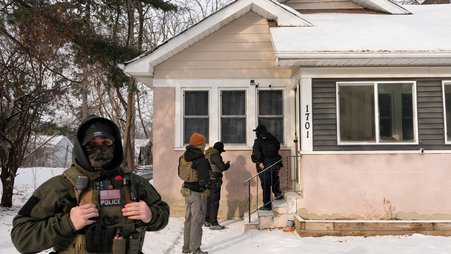House Intelligence Committee chairman Rep. Mike Rogers and his Democractic counterpart Rep. Dutch Ruppersberger published a press release today touting a classified Defense Department report alleging that Edward Snowden’s leaks—and by proxy, stories published by news organizations—threaten national security and “are likely to have lethal consequences for our troops in the field.”
Before going any further, let’s remember what the Washington Post reported just two weeks ago about the Director of National Intelligence (DNI), James Clapper:
Clapper has said repeatedly in public that the leaks did great damage, but in private he has taken a more nuanced stance. A review of early damage assessments in previous espionage cases, he said in one closed-door briefing this fall, found that dire forecasts of harm were seldom borne out.
Now go back and read the press release closely. No specific examples are given, and you will notice virtually every sentence includes the word “could”—meaning real damage hasn’t actually occurred, and they are just saying it potentially could happen. And of course, the actual report is secret, so the two Congressmen are able to say whatever they wish about it, and it can’t be independently verified. (Rep. Mike Rogers also has a long history of not telling the truth.)
We’ve seen this same scene over and over again in the past decade, and the results are always the same: the government serially exaggerates damage to national security in an attempt to make sure newsworthy stories are not published or to villify whistleblowers.
When WikiLeaks started publishing State Department cables in 2010, the administration was claiming in the media that WikiLeaks would have “blood on its hands.” But then it turned out, as Reuters reported, in private the government believed only “that a mass leak of diplomatic cables caused only limited damage” and that “the administration felt compelled to say publicly that the revelations had seriously damaged American interests in order to bolster legal efforts to shut down the WikiLeaks website and bring charges against the leakers.”
The Bush White House said the same thing—“you will have blood on your hands”—to New York Times editors before they published their original NSA warrantless wiretapping stories in 2005 and 2006. Bush Attorney General later threatened to prosecute the New York Times under the Espionage Act. Similar statements were made about Dana Priest’s investigation of CIA secret prisons for the Washington Post. The damage of course never materialized, and both Priest and the New York Times reporters went on to win the Pulitzer Prize.
This is a tried and true tactic used by the US government made famous by Richard Nixon. Back in 1971, the Nixon administration told the US Supreme Court that if the New York Times continued to publish the Pentagon Papers it would result in “grave and immediate damage to the United States.” The man who made those arguments, Solicitor General Erwin Griswold, later wrote in the Washington Post, “I have never seen any trace of a threat to the national security from the publication" of the Pentagon Papers. He called on the public to be skeptical of “national security” claims made using secrecy.
New York Times Executive Editor Jill Abramson probably said it best when she flatly stated last year, "No story about details of government secrets has come near to demonstrably hurting the national security in decades and decades."
Virtually any time newspapers print something the government doesn’t like, they will claim it hurts national security without providing any details or proof. This is standard operating procedure for them, and news organizations should not be scared to push back on such claims, without direct evidence to the contrary.




